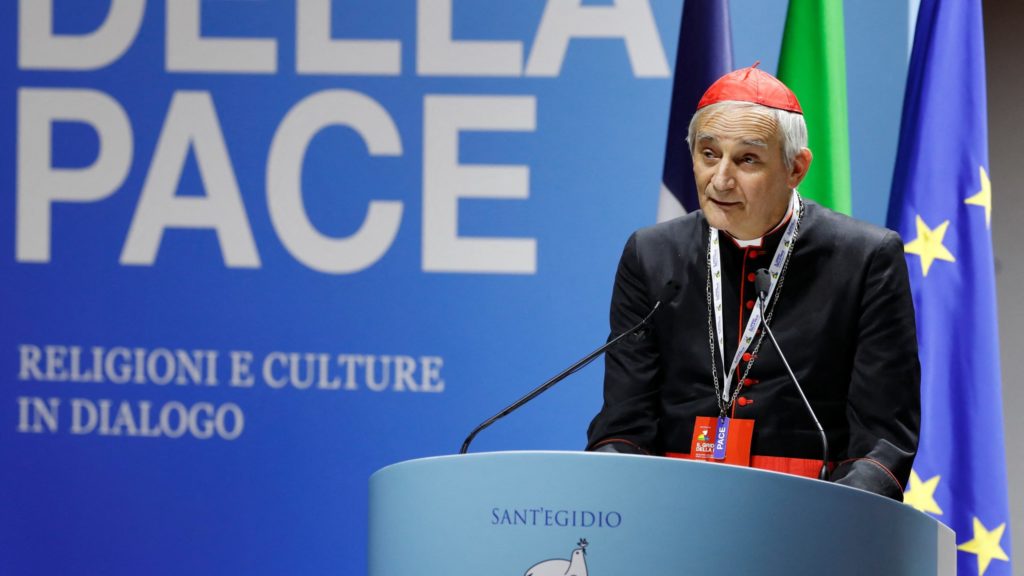Pope Francis’s personal peace envoy on Ukraine had a phone call Monday with a top Ukrainian official to discuss ongoing efforts to return children abducted by Russia amid the ongoing war sparked by their invasion of Ukraine nearly two years ago.
A Jan. 8 statement from the President’s Office said the Head of Office of the President of Ukraine, Andriy Yermak, had a phone call that day with Italian Cardinal Matteo Zuppi of Bologna, president of the powerful Italian bishops’ conference and Pope Francis’s handpicked peace envoy for the Ukraine war.
According to the statement, Yermak congratulated Zuppi on having recently been awarded the Order of Merit, II class, by Ukrainian President Volodymyr Zelenskyy, saying, “This is a recognition of your personal role in supporting Ukraine and the mission to return Ukrainian children.”
“I am very proud of our cooperation and appreciate everything you do for Ukraine and the Ukrainian people. I hope that in the near future we will have the opportunity to hand over the award to you,” Yermak said.
Zelenskyy announced his decision Dec. 28 to give the Order of Merit award to Zuppi and to Italian Cardinal Pietro Parolin, the Vatican’s Secretary of State, for their “significant personal contribution to strengthening interstate cooperation, their support of state sovereignty and the territorial integrity of Ukraine, and the popularization of the Ukrainian state in the world.”
On the same day, Zelenskyy had a telephone conversation with Pope Francis to exchange Christmas greetings and to discuss the peace process.
According to Zelenskyy, who spoke about the call in a video message posted to the social media platform X, he thanked the pope for his Christmas wishes and for “the spiritual support” he has given to the people of Ukraine.
Zelenskyy said he also thanked Francis for the public expressions of his desire for a “just peace for all of us,” and that the two discussed Ukraine’s Peace Formula, a 10-point plan Ukraine has put forward for achieving peace, with steps including the restoration of occupied territories and respect for Ukraine’s territorial integrity.
The Holy See has not directly voiced support for Ukraine’s formula, but Pope Francis last year tapped Zuppi as his peace envoy in a bid to facilitate dialogue among various parties involved, primarily at the humanitarian level.
Last summer Zuppi made visits to Kyiv, Moscow, Washington D.C., and Beijing, meeting with top-level officials, including U.S. President Joe Biden, to discuss the humanitarian situation on the ground, prisoner exchanges between Russia and Ukraine, and the return of Ukrainian children forcibly deported to Russia.
According to Kyiv estimates, roughly 19,592 children have been taken from Ukraine and deported to Russia in the course of the war.
Pope Francis in his annual speech to the diplomatic corps accredited to the Holy See, which took place Jan. 8, lamented the civilian toll of the various conflicts “lacerating” the world, specifically cited the wars in Ukraine and in Gaza, and calling for war crimes to be recognized.
“There is no conflict that does not end up in some way indiscriminately striking the civilian population. The events in Ukraine and Gaza are clear proof of this,” he said, saying, “We must not forget that grave violations of international humanitarian law are war crimes, and that it is not sufficient to point them out, but also necessary to prevent them.”
“Consequently, there is a need for greater effort on the part of the international community to defend and implement humanitarian law, which seems to be the only way to ensure the defense of human dignity in situations of warfare,” he said, saying civilian victims are not merely “collateral damage,” but real people.
Both Russia and Israel have faced allegations of war crimes against civilians in their respective conflicts.
Last year the International Criminal Court issued arrest warrants for Russian President Vladimir Putin on various charges including the deportation of Ukrainian children, and Russian politician Maria Alekseyevna Lvova-Belova, Commissioner for Children’s Rights in the Office of the President of the Russian Federation, for the unlawful deportation of Ukrainian children to Russia.
During the address to diplomats, the pontiff did not, however, make specific mention of the kidnapped children. There is speculation that Zuppi could make return visits to Kyiv and Moscow in his capacity as peace envoy, but it is unclear when this might happen, and no plans have yet been announced.
According to the Jan. 8 statement, Yermak during his call with Zuppi that day briefed the prelate on the current situation in Ukraine in the wake of a series of Russian missile attacks launched over the previous 10-day period.
Yermak also acknowledged Zuppi’s participation in a recent meeting of the International Coalition Bring Kids Back UA, formed in early December and whose inaugural meeting was held in the format of a video conference from Kyiv, and voiced hope that the Holy See would accede to the declaration put out of that session.
The two also discussed an upcoming meeting of national security and policy advisors to brief heads of state on the implementation of Ukraine’s Peace Formula that will be held in Davos, and during which humanitarian issues will also be addressed.

